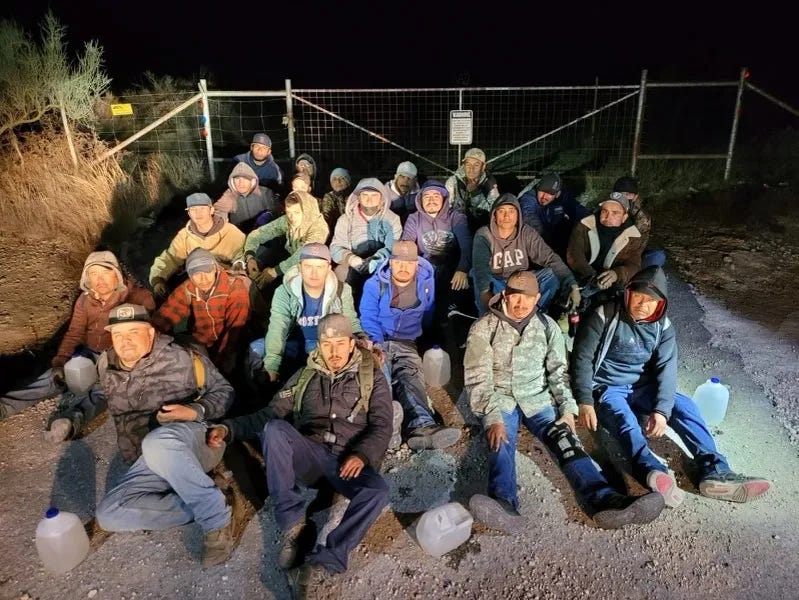Bringing Back "Illegal Alien"
Plus, Why Mass Deportations May be More Complicated Than Some Think
Good morning, friends,
There’s been such a whirlwind of activity, one might think that the Trump camp is purposely running a sort of blitzkrieg of appointments, moves, and other activities meant to just overwhelm opponents and critics in the press who wind up with little time to react to any one thing, before they must quickly move on to the next thing or risk irrelevancy.
Here at the Dispatch, we have been almost paralyzed in trying to peer at and digest various discrete actions, only to find ourselves eating dust. Homan, Hegseth, Hwats-their-names, and heverything else. Brain aneurysm!
What finally spurred us to write this morning, was spying a blurb on twitter from the Washington Examiner’s Ana Giaritelli, following reports that the Trump camp has considered jettisoning recent changes in government vocabulary that replaced “illegal alien” with words like “migrant.”
EXCLUSIVE — One of the first actions that President-elect Donald Trump could take come Jan. 20, 2025, is rescinding the Biden administration’s ban on the term “illegal alien.”
Advisers to Trump’s transition team on homeland security matters told the Washington Examiner this week that there have already been discussions on doing away with the Biden administration’s politically correct immigration language to talk about illegal immigrants at the border and within the country.
“In this [present] administration, we used ‘undocumented immigrants,’ right?” said a former high-ranking immigration official who now is involved in advising the transition team on policy. “Expect all of that to change.”
A second official involved in advising transition officials confirmed that talks on returning to “illegal alien” were true.
“I don’t see anyone at [U.S. Immigration and Customs Enforcement] or [U.S. Customs and Border Protection] using any euphemisms for illegal aliens after Jan. 20,” the second official said.
John Fabbricatore, a retired ICE field office director who was named by three sources as the top candidate to lead ICE under Trump, said he had not heard of the talks but supported the notion.
“What is wrong with illegal alien? It connotes no race, religion, or culture,” Fabbricatore wrote in a message Wednesday morning. “It is a purely legal term that was hijacked in an Orwellian attempt to control the messaging about illegal immigration.”
—Reporter Ana Giaritelli, The Washington Examiner
Longtime readers of the Dispatch can probably guess where we stand on the matter. The word-change always felt like some kind of clumsy silliness to us, silliness that took on darker aspects when you considered how language was being policed in places like the UK and might eventually wind up being policed here in the US.
We paused in our writing here to try and find an older dispatch where we addressed our own use of “illegal alien” instead of the nu-speak… but well, we’ve had to give up. We’ve apparently been obstinately consistent in the use of “illegal alien.”

At various times we’ve also used the word ‘migrant.’ We mostly have attempted to do so when attempting to distinguish between the relatively harmless self-surrenders at the ports of entry, and the determined illegals trying to avoid law-enforcement that have plagued Kinney County since the beginning of the crisis. In the end however, it must be stated that technically, all are illegal aliens, according to the classical legal definition.
In the photo above, our caption calls attention to the quality of the water this typical group of cross-country-hiking illegals were consuming. These are tough, tough guys, to be hiking this kind of countryside, drinking water of that kind of dubious quality the whole way.
If you detect notes of admiration in our tone, your sense of hearing is accurate.
Meanwhile, the always indispensable Todd Bensman has published a blizzard of material on X and elsewhere. We simply can’t bury you in all of his stuff, but one thing did catch our eye:
Steps must be taken to prevent the sort of oppressive gaslighting and censorship that has enabled an almost half-decade of torture and misery all along the border. To say nothing of the secretive midnight flights carrying apparent illegal aliens all over the country, granted some kind of cockamamie official status via tortured and disfigured US statutes by this administration.
Also, we should probably take a sober look at recent reporting about the proliferation of Tren de Aragua and other criminal gangs across the US as a result of this border crisis and how their presence is bound to complicate mass deportation efforts.
By some estimates, TdA alone is active in anywhere from 16 to 22 different states— possibly operating as an unacknowledged paramilitary force for the Venezuelan Government.
Promise you, run-of-the-mill cartel members are active in all 50 states.
What might happen, if US military units are activated to go into neighborhoods and/or ghettos looking for these people in some kind of a crackdown?
Some fear that TdA and others may be militant enough to violently resist such an effort. That they may already be prepared to carry out some kind of an insurgency within the US.
To us here at the Dispatch, this seems unlikely. But, is that just us being Suzy Sunshine Optimists again?
About a year ago, we imagined what it might be like, if someone were to conduct a half-serious campaign of organized violence inside the US.
We called the essay “Call Me God,” it remains one of our recent favorites.
"Call Me God"
And finally this morning, we’ve been thinking a lot about the modern condition. The vague sense of dissatisfaction that seems to loom over the lives of so many Americans today. It is this sense of dissatisfaction, we believe, that drives the appeal of various television shows like The Sopranos, Mad Men, and Breaking Bad, among others.
A common thread running through each, is of people entering their middle years, seemingly living high-achieving lives, or not, and being utterly disenchanted with it all.
This a theme that speaks to many. People who’re running the race of life, imagining that they can see the finish line somewhere in the distance, and perhaps thinking that they’ve made the wrong choices, or been deceived somehow, or are just vaguely dissatisfied for reasons they’ve been unable to put into words.
What we’ve all been missing, possibly, is a feeling of agency. Of control over our own lives. Much of that sort of a feeling can be an illusion of course. The feeling of self-control— of autonomy— is necessarily punctured every time one has to fork over money to the government for the privilege of breathing air and living a life.
And yet, there are times where one feels more self-assertive than others. More fulfilled, happier, wiser, and more positively productive.
For some, these occasions come while in the middle of an artistic pursuit. Or in the achievements of their children and spouse. Or in being able to declare a meaningful sovereignty of one. Or two.
For others of a more addiction-prone or self-destructive bent, they come during the conquest of new romantic partners.
At the furthest end of the scale, one can see an entirely negative reflection of these drives and needs in the hopeless addict, who tells himself that the rejection of a more positive way of living, in favor of the next spike in his veins, is his ultimate expression of self-ownership.
This sort of bohemian hobo gutter sensibility, when viewed in the most generous of light, draws comparisons to Diogenes of Sinope, and his semi-legendary encounter with Alexander the Great on the streets of Corinth—the gutters of which being where Diogenes lived at the time.
Thereupon many statesmen and philosophers came to Alexander with their congratulations, and he expected that Diogenes of Sinope also, who was tarrying in Corinth, would do likewise. But since that philosopher took not the slightest notice of Alexander and continued to enjoy his leisure in the suburb Craneion, Alexander went in person to see him, and he found him lying in the sun. Diogenes raised himself up a little when he saw so many people coming towards him and fixed his eyes upon Alexander. And when that monarch addressed him with greetings, and asked if he wanted anything, "Yes," said Diogenes, "stand a little out of my sun."[7] It is said that Alexander was so struck by this, and admired so much the haughtiness and grandeur of the man who had nothing but scorn for him, that he said to his followers, who were laughing and jesting about the philosopher as they went away, "But truly, if I were not Alexander, I wish I were Diogenes."[8]
Other versions of the tale include the men identifying themselves, with Alexander calling himself ‘The Great King,” and Diogenes calling himself “Diogenes the Dog.”
We’ve said it in the past— people deserve the promise and the potential of their own aspirations. Too many are trapped in a cubicle maze of power-point presentations, keeping up with the Joneses, or worse- are too busy struggling to hold together and raise shattered families on their own.
Some of the occasions where meathead philosopher Joe Rogan can be most compelling is when he holds forth on the need for society to create “less losers.”
The definition of “loser” is of course one that can be loosely applied to a wide swath of the current population, as both a pejorative and a simple identifier. But to us, for our purposes, it seems to be a mostly self-applied term. That is to say— someone that feels like a loser, “knows” it. Hates it. Hates themselves.
With that information in hand— one can perhaps more easily follow what Rogan means to be saying: It’s difficult to heal a society, when a significant portion feels like a loser.
Complicating things, it’s not as simple as passing out trophies and telling everyone what winners they are. No. The path out of this sort of hole must be found and trod by the person that is in it. Praise from outside the hole is not enough to support the one down in it. The best anyone can do for the Diogenes in their life is to stand aside and let them make the climb without getting in their way.
Odds are, even the best of us has felt the need to do a little climbing in recent years. Here’s to it. Hope to see everyone doing their version of the Trump dance in the months to come, at the rim of whatever hole they’ve conquered.

On this silly-but-serious note, we’ll call it a day. Hope you’re having a great week with an even better weekend on the horizon. As always, no one should confuse this humble newsletter with any sort of an official communication by Kinney County, TX. It is kept as separate as possible from our day job, fielding public information and press requests in Kinney County. We make this disclaimer for obvious reasons, and to remain in keeping with County policies regarding employees and social media.
It is produced without oversight, and sometimes without enough self-editing, resulting in necessary and sometimes embarrassing corrections. Which is as it should be.
We’ll see you again somewhere on down the road.





Your "silly but serious note" was also masterful. Everything from Diogenes to the Trump Dance. Enjoyed the ride.